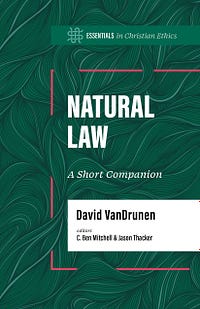It is important to clarify exactly what we are considering as we turn to the use of natural law in the public square. I wish to address how Christians might engage non-Christians on moral and political issues of common concern. But I am not addressing how Christians should evangelize non-Christians. Evangelization is one of the church’s central purposes, as Jesus’s Great Commission indicates (Matt 28:18–20). In what follows, I assume the importance of the Great Commission but discuss a different subject. God does not want Christians to dissociate themselves from non-Christians in earthly affairs (1 Cor 5:9–10). He calls us to live peacefully with them as far as possible (Rom 12:18). We live under the same political authorities as non-Christians (Rom 13:1) and work alongside and under them (1 Thess 4:11–12; 1 Pet 2:18).
This means that there is more to Christians’ interaction with their unbelieving neighbors than just evangelizing them. Since we share neighborhoods, workplaces, governments, and much else with them, we have keen interest in how peacefully they live, how well they work, and how they evaluate what is just. As with the Israelite exiles in Babylon, so too for Christians as exiles in the world: when our surrounding society prospers, we will also, generally speaking (Jer 29:7; cf. 1 Pet 2:11). Thus, Christians rightly look for ways to promote what is good and just in their communities. Even if our unbelieving neighbors do not believe the gospel, we still want them to be industrious rather than lazy, sober rather than drunk, peaceful rather than violent, and married rather than cohabitating. The question before us then is how we can engage them in ways that promote such practices and habits, and specifically why and how to do so through the natural law.
A Perspective on the Use of Natural Law
I suggest first that Christians should be nondogmatic and flexible about the way they engage non-Christians in public affairs. The New Testament gives no specific instruction on how to engage them nor even any examples of early Christians doing so. It leaves this to our discretion. This makes things more challenging for us in a way, but it also frees us to be creative. It should also keep one Christian from being too quick to condemn fellow believers for making different judgments about how to pursue this engagement. Nevertheless, we do want to make sound and effective judgments, so it is worth giving this issue some thought.
Before considering the use of natural law, we might wonder about using Scripture in the public square. Nothing prohibits this, and there may be occasions when it is appropriate. But it is probably not the wisest or most effective strategy in most cases. Obviously, Christians proclaim Scripture when evangelizing, and Christians should surely discuss biblical teaching when speaking with each other about public affairs. But why would we appeal to Scripture when engaging unbelievers? One possibility is that Christians do so to feel good about themselves, as if it proves that they are not ashamed of Christ or afraid to be ridiculed. Few believers would likely want to admit to such motivations, but I suspect it often plays some role. It is not a good reason. Of course, Christians should never be ashamed of Christ, but the point of engaging unbelievers in the public square is not to bolster our spiritual self-esteem but to advance what is good and just in society. And there are strong reasons to think that appealing to Scripture usually will not further a Christian’s public-policy goals. Appealing to Scripture (especially with the attitude of trying to prove one’s unashamed loyalty to Christ) communicates that whatever moral point we are trying to prove is a Christian thing, since the Bible is Christians’ holy book. Non-Christians do not regard Scripture as authoritative. If we say “the Bible teaches this moral position,” non-Christians will logically conclude that this is what Christians believe but will also likely conclude that it is irrelevant for them. That is not what we should want to communicate when seeking to promote what is good and just in our societies. Such appeals to Scripture seem likely to drive a deeper moral wedge between believers and unbelievers, when what we seek is just the opposite. To put it another way: the goal of engaging non-Christians in the public square is to persuade them on moral and political issues of common concern, but appealing to Scripture is more likely to dissuade than to persuade.
Another reason why Christians might appeal to Scripture in this setting is simply because it is easier than other options. If one is dealing with public debates about sexuality, for example, it is easy to find biblical verses that teach the immorality of certain practices and lifestyles. We can recite these verses and be done with it without much effort. In contrast, trying to persuade non-Christians through appeals to the natural law is considerably more difficult and intimidating. How exactly does nature teach this or that? How can I communicate this point effectively? Answering these questions is neither obvious nor easy, but following this route is usually appropriate and possible.
It is appropriate because natural law is the moral standard Christians and non-Christians share. On the one hand, natural law addresses human beings as human beings. On the other hand, the New Testament says to readers: You have been raised with Christ; therefore, conduct yourselves in such and such a way (Col 3:1–5) and live lives worthy of your calling (Eph 4:1). That is, Scripture says: you are Christians, participants in God’s salvation in Christ, so behave accordingly. In contrast, the natural law (in effect) says: you are human beings, creatures made in God’s image, thus act in a fitting way. Natural law addresses non-Christians in a direct way that biblical commands generally do not.
Making natural-law appeals is possible (though challenging). If we really believe what Scripture teaches, then we believe that the testimony of natural law is powerful. It is clear enough to hold all people accountable on the day of judgment (Rom 1:20). We believe that at some level all people know the content of natural law and the just consequences of rejecting it (Rom 1:20–21, 32). Furthermore, there must be a considerable degree of natural-law perception embedded in our communities, at least for those of us who live in productive and functional societies that are mostly peaceful and protect against many kinds of injustice. Natural realities also constrain people from being as bad as they want to be. Many people tempted to commit adultery do not because they do not want the pain and loss of a family breakup. Many people tempted to be lazy keep working hard because they know they must eat: “A worker’s appetite works for him; his mouth urges him on” (Prov 16:26).
In short, Christians face real challenges when engaging unbelievers with the natural law, but they also have a lot going for them. Christians have a stronger hand than they may think. They have reality on their side.
— David VanDrunen (PhD, Loyola University Chicago; JD, Northwestern University School of Law) is Robert B. Strimple Professor of Systematic Theology and Christian Ethics at Westminster Seminary California.
---
Excerpted from Natural Law: A Short Companion by David VanDrunen (B&H Academic, 2023). Used by permission.
“As the public square spirals, natural law could not be more relevant. Without it, we lose the ability to persuade non-Christians of a moral framework so critical to the survival of human dignity and a just society. Employing natural law in the public square can be intimidating, but VanDrunen’s accessible, lucid book is the guide every Protestant needs to recover natural law today.”
— Matthew Barrett, professor of Christian theology, Midwestern Baptist Theological Seminary
“Christians know the Ten Commandments but might be surprised to discover that God has also written his law in creation and upon the hearts of all human beings. Such an idea is neither human invention nor merely church tradition but a scriptural truth that VanDrunen explains with clarity, concision, and conviction. He ably shows natural law’s biblical foundations, theological characteristics, and connections to everyday life. Christians who want a deeper understanding of what the Bible has to say about natural law will benefit from this book.”
— J. V. Fesko, Harriet Barbour Professor of Systematic and Historical Theology, Reformed Theological Seminary
Find Natural Law: A Short Companion at Amazon, B&H Academic, and other major booksellers.
*sponsored post











